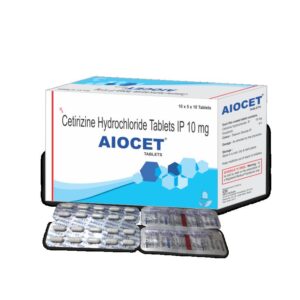CETRIZINE
CETRIZINE: Cetirizine is an antihistamine drug commonly used to relieve allergy symptoms such as sneezing, itching, runny nose, and watery eyes. It is also effective in treating symptoms of hay fever, hives, and other allergic reactions.
The drug works by blocking the action of histamine, a natural substance that is released in the body during an allergic reaction. By preventing histamine from binding to its receptors, cetirizine helps to reduce the allergic response and alleviate the associated symptoms.
Cetirizine is usually taken orally in the form of tablets, capsules, or a syrup. The recommended adult dose is typically 10mg once daily, while children may require a lower dose based on their age and weight. It can be taken with or without food, but it is advisable to follow the instructions provided by your healthcare provider or the medication label.
While cetirizine is generally well-tolerated, it may cause certain side effects in some individuals. Common side effects include drowsiness, dry mouth, dizziness, headache, and fatigue. These side effects are usually mild and transient. It is important to avoid activities that require mental alertness, such as driving or operating machinery, if you experience drowsiness.
In rare cases, cetirizine may cause more serious side effects like allergic reactions, irregular heartbeat, difficulty urinating, and severe dizziness. If you experience any of these symptoms, it is important to seek immediate medical attention.
It is essential to consult with a healthcare professional or pharmacist before starting cetirizine, especially if you have any pre-existing medical conditions or if you are taking other medications, as there may be potential drug interactions.
Overall, cetirizine is a widely used and effective antihistamine for the treatment of allergies, but it is important to use it as directed and be aware of potential side effects.

